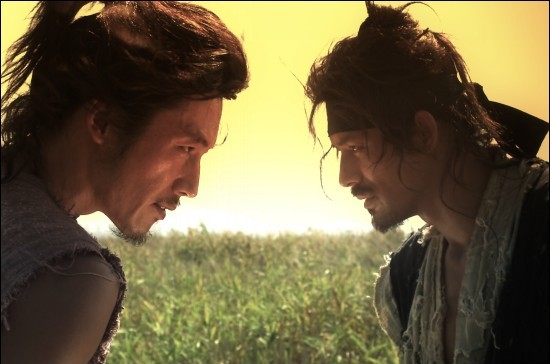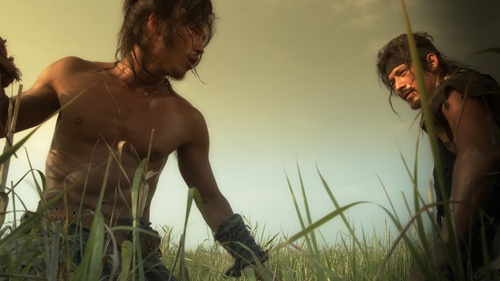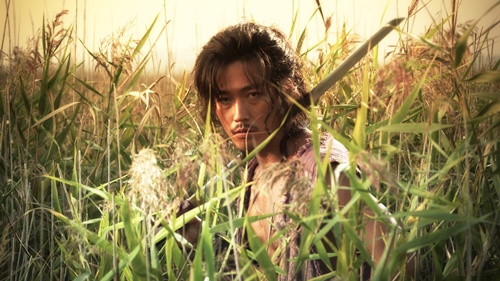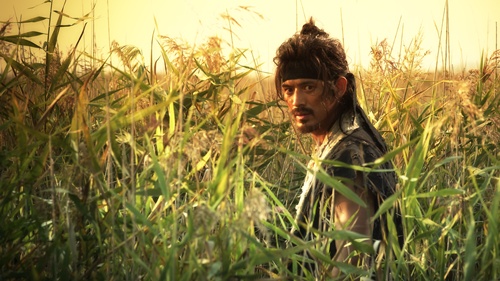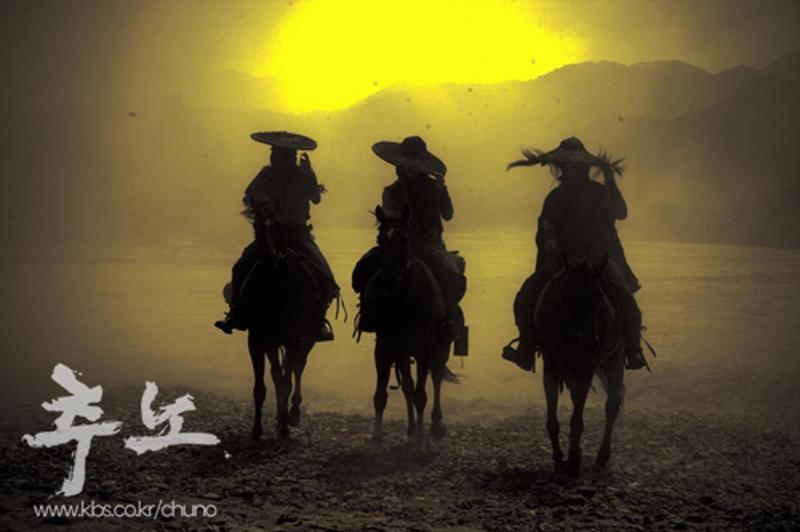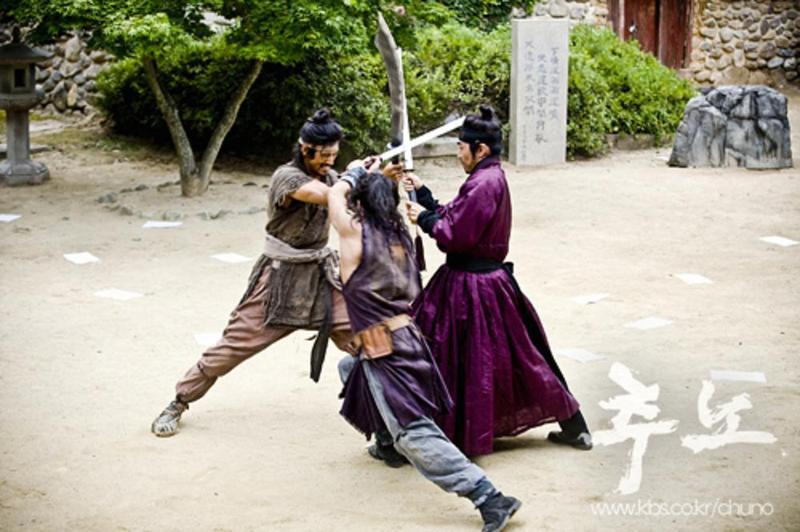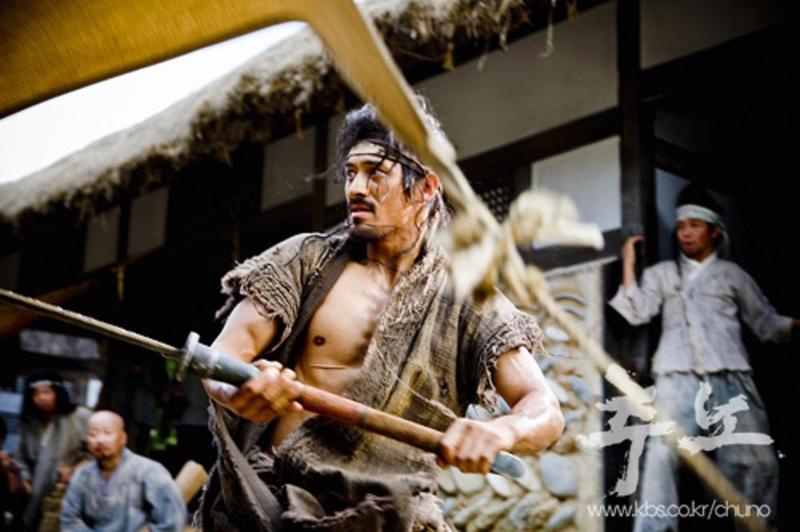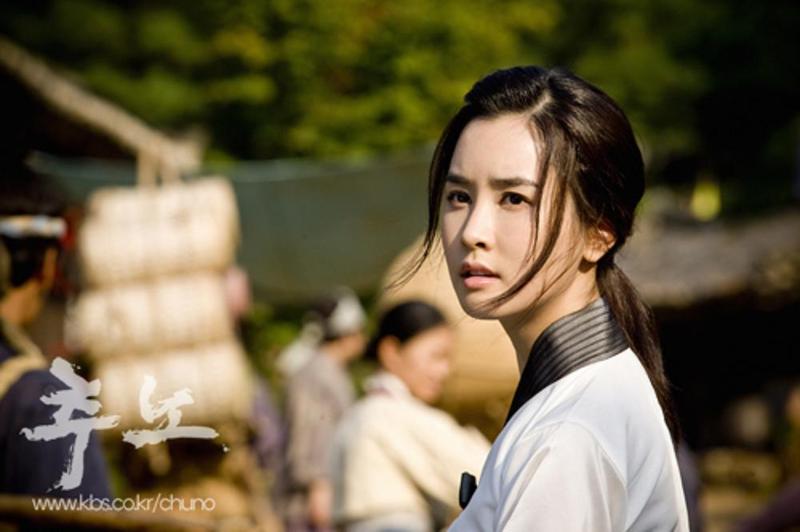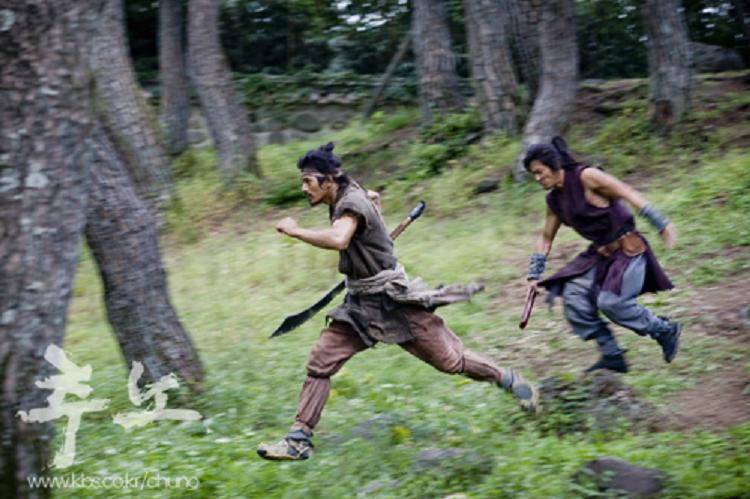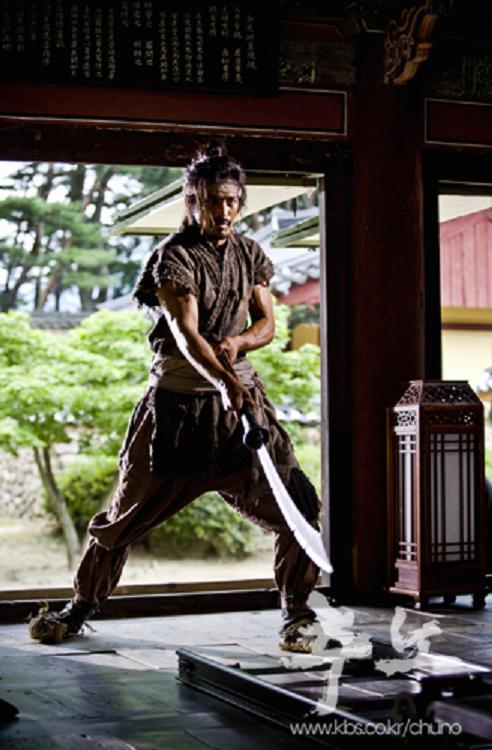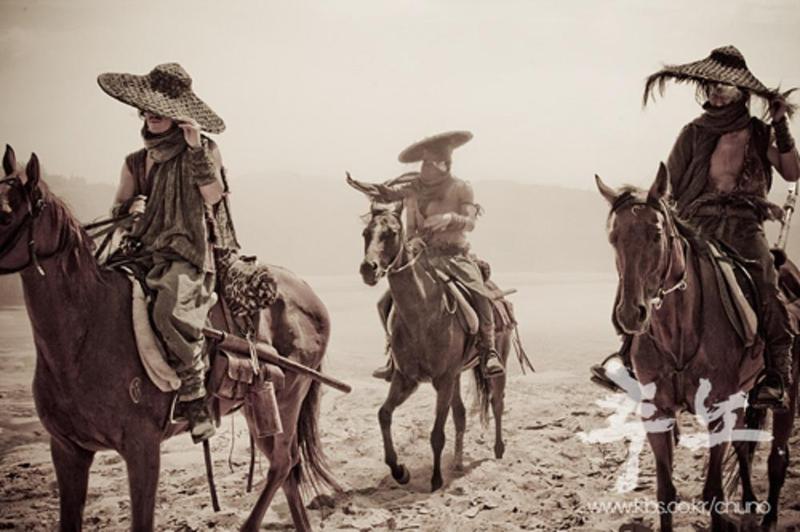[PREVIEWS] 추노 (Slave Hunters)
![[PREVIEWS] 추노 (Slave Hunters)](https://screenanarchy.com/assets_c/2012/09/chunopost-thumb-430xauto-13149.jpg)
Insidious because, against any prediction, Kwak has become a sort of hot commodity for the industry. His debut, produced after ten years spent building his street cred with striking genre short dramas and growing under talented veterans, might have scored rather insignificant average ratings (around the 6%), but it has become such a cult hit that many more people have decided to rediscover what they had regrettably ignored, something TV execs can no longer label as a failure, or continue to nonchalantly overlook. But then Kwak made an interesting U-turn, producing the first episode of last year's horror series 전설의 고향 (Hometown of Legends), which returned to the small screen after a nearly ten year hiatus. Kwak took the format's quintessential folk legend (the fox with nine tails) and turned it into a sexy and irreverent neo-horror with touches of social commentary and political allegory, the same aura which graced his debut (allegory which, considering what happened to Roh Moo-Hyun, is all the more startingly brilliant). 구미호 (Fox with Nine Tails) was a surprising success, scoring a very healthy 20% and perhaps granting Kwak the green light for something much bigger and ambitious, which after a failed partnership with supremely talented writer In Jung-Ok turned out to be Slave Hunters. Conspiracy in the Court only cost 800 million won for its eight episodes, a pittance even compared to the average sageuk on TV, and his horror short last year couldn't have cost over the 150 million won. What this means in layman's terms is that we're dealing with a superior talent (both in terms of storytelling and visuals), but also someone who doesn't waste any money. So what could possibly be the problem?
Although KBS is by far in a much better position compared to its two major rivals when it comes to diversity, and they still have at least the courtesy of not letting ratings control the narrative flow of a show, Slave Hunters will be under pressure from day one, even if it certainly won't be a bloated blockbuster in name only - think of SBS' lurid throwback to 80s action melodramas with 태양을 삼켜라 (Swallow the Sun) and MBC's 에덴의 동쪽 (East of Eden). Produced by a major independent company like Chorokbaem Media - of 2006 ratings juggernaut 주몽 (Jumong) fame - and sporting a much more prestigious cast than anything Kwak has ever dealt with, this show will in many ways challenge him to tone down the complexity and historical relevance which made his debut so meaningful - but, on the other side of the coin, a lot more difficult to approach for the casual viewer, particularly if all you were looking for was 60 minutes of background noise to let the stress of the day evaporate into thin air. And maybe action (tons of it) shot with fancy Red One cameras might just be the answer. But let's not get ahead of ourselves... what on earth is this "chuno" of the Korean title, and how does it tie with slavery in that particular period's context?
CHUNO
As it's always the case when dealing with the unnerving nature of Korean historical documents (or what remains of them), we can only speculate when slavery began spreading around the Korean peninsula and the Manchurian plains which hosted the ancient ethnic fabric of the land of morning kimchi. If you just stick to records, there's a mention going back to Gojoseon and the fourth century BC, noting how one part of the centralized kingdom's eight capital punishments consisted of turning thieves into slaves. Sure enough, their neighbors up north, Buyeo, did something quite similar, consigning any clan of a convicted murderer to a life of slavery (while the culprit would be content with a cruel demise, I suppose). This practice continued well into the golden age of the tumultuous Three Kingdoms, which seemingly spent half the time engaging in fratricidal wars (if you pardon the rather anachronistic 20/20 hindsight), so they clearly had plenty of prisoners of war to deal with, some of whom ended up becoming slaves. But the real spark which ignited slavery in the Korean peninsula happened several centuries later, during the Goryeo Dynasty, when Jeongjong enacted the 천자수모법 (Matrilineal Inheritance Law) in 1039, which made sure lineage was acknowledge only via matrilineal lines, making slaves a bonafide caste.
Essentially, there were four ways to become a slave in Goryeo or Joseon, an evolution of previous systems used by older kingdoms in the area: via the aforementioned matrilineal lineage (신분노예, slaves by origin), for failing to pay debts (부채노예, slaves by debt), for committing serious crimes (형벌노예, slaves by punishment), and finally as prisoners of war (전쟁노예, war slaves). When you think of the concept of slavery and how it's been portrayed by many a historical drama, you might be misled to think that it's a simple matter of lowborn doing forced labor for their keepers, but even within this caste there were many distinctions and a variety of different lifestyles, from the very bottom of the barrel to something which nearly approached the free commoner. The major distinction was between 공노비 (government slaves) and 사노비 (private ones), which is pretty self-explanatory, but again not so clear-cut as you might think - for instance, government slaves enjoyed a much less burdensome status, and sometimes even employed slaves of their own.
Amongst both classes were the so called 외거노비, slaves who lived in independent households, be it outside the state's local administration or the keeper's residence, and had to pay a sort of archaic form of tenancy instead of doing labor, consisting in a fixed amount of hemp to be handed over every year - known as 공포 (tribute cloth). Not only was their life much more independent than the private slaves who spent their existence doing menial jobs inside a noble's residence, but from the chaos of the two Manchu invasions all the way to King Jeongjo's renaissance, this once strict Neo-Confucian based caste system had started to vacillate, so much that the 속대전 (Supplementary National Code) compiled during the late 18th century noted that thirteen seok (around sixty US bushels) of rice were enough for one of these "tenant slaves" to free himself from slavery - just like affluent merchants could easily buy their way into nobility.
Whereas the slave lifestyle passed down through matriarchal lines made sure that submission to one's keepers was an almost Darwinian tenet ingrained into their minds from birth, the condition of these tenant slaves was close to commoner life enough that they would foment the desire to escape and find freedom, much more so than any other slave, a practice which was all the more common during the early years of the Joseon dynasty. To combat this, the government enacted the 노비추쇄법 (Slave Confinement Act), the foundation for a full fledged apparatus which dealt with runaway slaves - both those who escaped from forced labor, and particularly these tenant slaves who failed to pay their annual tribute. Here is where our "chuno" comes into play. That is because 推奴 (chuno, slaves refusing their responsibility, or pushing slaves to live up to their responsibilities) was exactly the crime committed by these runaway tenant (or private) slaves, moving the Office of Slave Confinement to send professional hunters after them, often labeled 추노꾼 or 추쇄꾼 (our slave hunters of the title).
Slightly similar to freelancer bounty hunters, their job was bringing those slaves back to their patrons so that things would return to normality (and they would pay the tribute cloth which in many ways sustained their keepers), or so that they could face their crime through due procedure, something the strict Neo-Confucian Joseon society always clamored for (at least on the surface). Killing their "prey" wasn't an issue, but rather the last possible option, as their reward would severely suffer as a result. Slave Hunters focuses on this peculiar class of professionals, but as always with Kwak Jung-Hwan's works, it's only a fraction of the bigger picture, which involves politics in the mid Joseon era (from the Manchu invasion to the conspiracy behind Crown Prince Sohyeon's death), action and that touch of realistic romance which always opened his works to a much wider audience (despite what the rather intricate plotting he's famous for might suggest).
HISTORICAL BACKGROUND
The time is the mid 17th century, right at the end of the second Manchu invasion, known as 병자호란 in Korean ("The Manchu attack on the Byeongja year," the name given to 1636 on the Chinese-influenced Joseon calendar). After Joseon refused to acknowledge vassalage to Huang Taiji's newly christened Qing dynasty, the Manchu forces invaded the Korean peninsula a second time in the winter of 1636, with uber-general Prince Yu (Dodo) leading an army of over 100,000. King Injo fled to Namhansan Fortress to find refuge, but a collection of bad strategical decisions and poor logistics essentially spelled the end for him and his country. Whereas Goryeo resisted a whole forty years against the Mongol invasions, and the Imjin War against Japan lasted seven years, this second Manchu invasion was pretty much over in a two month span, the price to pay perhaps even greater than the former two devastating conflicts. What the Manchu asked from Joseon was becoming a vassal to the Qing; stopping the use of Ming nomenclature and title roles, and any trade and diplomatic relations with them; sending the king's two eldest sons to them as hostage (which turned out to be Crown Prince Sohyeon and Prince Bongnim); aiding the Qing with reinforcements in case of any conflict with the Ming; establishing marital relationship between Qing courtiers and Joseon nobles, sending a hefty annual tribute, and many other minor details. Joseon's economy was devastated by all this, not to mention the country's morale, after King Injo infamously kowtowed before Huang Taiji several times.
THE MAIN CHARACTERS
Jang Hyuk plays Dae-Gil, a son of a yangban clan caught in the maelstrom of the Manchu invasion, who ends up losing his family and fortune because of the runaway slaves they employed, one of whom was the woman he fell for, Eon-Nyeon. With vengeful thirst mixed with the desire to find his long lost roots, he begins a new life as a professional slave hunter, which will take an interesting turn once his commission's protagonist is former man of arms Song Tae-Ha, and the woman who is tagging along with him.
It's an interesting character, consider Jang's career. You always get the feeling that he had a lot more to offer than his choice of projects suggested, particularly considering his natural charisma and screen presence. Although he started acting much earlier, 화산고 (Volcano High) christened him as a bonafide star, after which he spent the following five years alternating dubious choices on the big screen - romcoms like 영어완전정복 (Please, Teach Me English) and 내 여자친구를 소개합니다 (Windstruck) - and even more puzzling ones on TV - the quasi-sageuk 대망 (Dae Mang) with Son Ye-Jin and Lee Yo-Won, and the romcom 명랑소녀 성공기 (A Joyful Girl's Success Story) alongside Jang Na-Ra. And that's really the point: Jang has shown sparks of good acting, and he's even been in a couple of good projects, like 2007's 고맙습니다 (Thank You), but he still has no magnum opus, no project which stands out or suggests that he might indeed one day live up to his potential. Kwak works wonders with his casts, so there's a good chance his explosive charisma (which often turns into overacting) will be channeled the right way. But, no matter what kind of performance he will give, Slave Hunters is already his most important project, the first one which truly shows he's aiming a little higher than simple stardom.
Oh Ji-Ho is Song Tae-Ha, a formidable military commander who lost his family during the Manchu invasion, and was forced by fate to follow Crown Prince Sohyeon to the Qing capital. Returning to Joseon after eight long years spent with the man many people believed could become Joseon's future and witnessing his mysterious death (so the drama begins around 1644, in theory), Song gets involved in a political conspiracy which falsely accuses him, and forces him into slavery. But his refusal to abandon his aspirations, and the dreams he covets for Sohyeon's last remaining son (Royal Successor - in disguise - Seok-Gyeon) lead him to run away, with Dae-Gil and his band of hunter misfits on his trail.
Oh was a rather peculiar choice, but not entirely surprising, considering Kwak's track record. The two first worked together when Kwak was line producer on last year's romcom 싱글파파는 열애중 (Single Dad in Love), and I'm sure he saw an interesting challenge in casting him. Interesting because Oh has never really shown any spark in the acting department before. He's generally been known for doing a respectable job on his mostly undemanding roles, but this gives stepping to the plate a new meaning. If anything, Oh looks the part like few other actors of his generation (with enough star power for the role) could: he has the build of an action star, but also an air of melancholy which could suit Song Tae-Ha quite well. Whereas there should be very little to worry about when it comes to slave Song Tae-Ha, famous commander Song Tae-Ha might be a tad more awkward, particularly considering Oh's issues with delivery. But considering how Kwak has dealt with lesser actors in the past, the benefit of the doubt is a must.
Lee Da-Hae is slave Eon-Nyeon. Despite finally realizing what her condition is all about, she continues harboring feelings for young master Dae-Gil, but then the Manchu invasion sends everything into disarray. Eon-Nyeon is sold by her keepers for trying to seduce her young master, her family completely devastated. One day before they take her away, her brother sets Dae-Gil's house on fire driven by spiteful whims, killing everyone but him, and running away with Eon-Nyeon. Eight years have passed and the two are enjoying a much better life: Eon-Nyeon bought herself freedom from slavery and a new name, Hye-Won - thanks to the infamous thirteen seok of rice, I suspect, courtesy of her brother's endeavors as a loan shark. But again fate turns things around: on her first night after marriage, she runs away and eventually meets Tae-Ha, becoming embroiled in all the political controversy which is surrounding him. Little does she know that the man going after Tae-Ha is her old, er, young master.
Certainly Kwak's greatest asset in terms of casting (at least when it comes to the younger stars), Lee Da-Hae is amongst the most misused talents in the industry, in no small part because of her choice of projects. Take a look at her career prior to this choice, and only the 2005 revenge thriller 그린 로즈 (Green Rose) had any substance. Had Lee mixed TV with films and starred in material which suited her talent, she now would be heralded as one of the finest actresses of her generation, alongside names like Son Ye-Jin and Gong Hyo-Jin. Lee's versatility and raw talent actually surpass Son's in many ways (whereas Son's screen presence is pretty much peerless), but the lack of projects which could showcase such skills has severely hurt her in the process. This is the first, serious chance she has to show all the sparks of greatness which the below-average projects she chose often buried, and if she starts showing the kind of confidence which brought Son Ye-Jin out of trendy dramas and into the upper echelon of Chungmuro's stars, then we'll hear a lot more about the young star in the coming years, perhaps even on the big screen. What's for sure is that sageuk needed a lead like Lee Da-Hae, and we can only thank Kwak Jung-Hwan for once again playing the thinking man, in an industry increasingly indifferent towards quality.
Featuring Kwak regulars like Han Jung-Soo, Kim Ha-Eun and Kim Eung-Soo alongside proven commodities like Lee Jong-Hyuk and Gong Hyung-Jin, not to mention interesting choices like Jo Jin-Woong and Yoon Ji-Min (as a female fighter), Slave Hunters boasts one of the most eclectic casts of recent memory, but if there is a lone question mark, that is the writer. That is not to say Cheon Seong-Il is a bad choice, but it certainly comes out of left field, particularly considering what he's been involved with in the past - including this year's big box office hit 7급 공무원 (My Girlfriend is an Agent). Then again, one might suspect why Kwak chose him (or why the producers did anyway): Cheon has a pretty significant talent for snappy dialogue and narrative flow, something the directors of his big screen projects failed to live up to on more than one occasion, but also the perfect kind of setup for someone like Kwak, who's always made thematic consciousness his calling card. What you can expect is a lot of political allegory and social commentary, romance which doesn't smell (a rarity on Korean Tv), and action done with panache but the kind of realism which would make Jung Doo-Hong proud.
Whatever its ratings end up being, Slave Hunters has all the cards to become another confirmation of Kwak Jung-Hwan's immense talent, herald the advent of potential new stars, and finally confirm the nearly limitless potential of people whose bad choices had hidden for so long, like in Jang Hyuk and Lee Da-Hae's case. And we'll be there, when it starts its run on KBS this January 6. I'm not too big on episode reviews anymore, but we'll keep track of the 24 episode show from time to time, and end things with a big review, possibly surrounded by a couple of surprises in tune with our 한성별곡-正 (Conspiracy in the Court) special as icing on the cake. But what really counts is that finally some light is kindling all this darkness which has been afflicting the Korean TV industry since 2008. It's just ironic that it's not kings, queens or national heroes who are carrying its torch, but good old slaves. What would Douglass think of that?















Do you feel this content is inappropriate or infringes upon your rights? Click here to report it, or see our DMCA policy.


